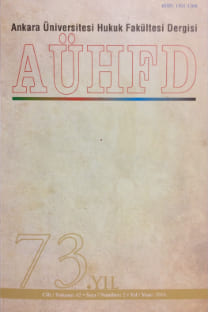ÖZEL MÜLKİYET HAKKININ TEMELİ OLARAK EMEK
Locke, Waldron, Marx, emek, özel mülkiyet
Main D’oeuvre As The Basıs Of The Rıght Of Prıvate Property
Locke Waldron, Marx, main d’oeuvre, labour, private property,
___
- David P. Ellerman, Property and Contract in Economics, Cambridge: Blackwell, 1992.
- G. A. Cohen, “The Labor Theory of Value and the Concept of Exploitation,” Philosophy and Public Affairs 8 (1979).
- Hegel, Philosophy of Right, Amherst: Prometheus Books, 1996.
- Henry George, The Complete Works of Henry George: Progress and Poverty, New York: Doubleday, 1904.
- İmmanuel Kant, The Metaphysics of Morals, Cambridge: Cambridge University Press, 1996.
- Jeremy Waldron, “Two Worries About Mixing One’s Labor,” The Philosophical Quarterly 33 (1983).
- Jeremy Waldron, The Right to Private Property, Oxford: Clarendon Press, 1988.
- John Locke, Two Treatises of Government, Cambridge: Cambridge Üniversity Press, 1988.
- Karl Marx, “Value, Price, and Profit,” in Eugene Kamenka (ed.) The Portable Karl Marx, New York: Penguin Books, 1983.
- Robert Nozick, Anarchy, State, and Utopia, New Jersey: Basic Books, 1974.
- S. R. Munzer, A Theory of Property, Cambridge: Cambridge University Press, 1999.
- ISSN: 1301-1308
- Yayın Aralığı: 4
- Başlangıç: 1943
- Yayıncı: Ankara Üniversitesi Hukuk Fakültesi
The Assessment of the Article 63 of the Public Procurement Act in the Perspective of EU Law
The Evaluation Of Macroeconomic Impact Of Free Zones: Turkey Case
ÖZEL MÜLKİYET HAKKININ TEMELİ OLARAK EMEK
KAN LEKELERĐNE ETKİ EDEN ÇEVRESEL FAKTÖRLER
Nihal AÇIKGÖZ, Özer KENDİR, Yaşar BİLGE
